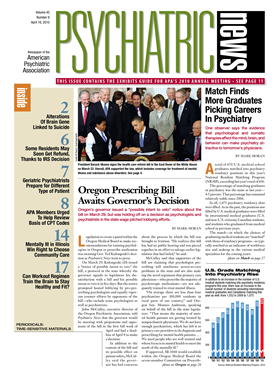Neurological decline occurs naturally in aging adults even in the absence of dementia or other pathological causes. To fight this decline, researchers and commercial interests are racing to meet the rising demand to preserve the youth and vitality of the brain.
The market for brain-fitness products and interventions amounted to about $265 million in 2008; by 2015, the sales figure is projected at $1 billion to $4 billion, according to William Reichman, M.D., a professor of psychiatry at the University of Toronto and president and CEO of Baycrest, an academic health center at the university that focuses on aging issues.
“There is a whole movement afoot to maximize our cognitive abilities as we age,” Reichman said at the annual meeting of the American Association for Geriatric Psychiatry in March.
Lifestyle changes, physical exercise, nutritional supplements, drugs, and brain-exercise tools such as word puzzles and Sudoku have all been suggested as potential ways to prevent cognitive decline. For now, only physical exercise has been shown to be clearly effective in numerous clinical studies, but other brain-fitness methods are attracting the attention of both academia and commercial enterprises. A growing number of cognitive training applications have been developed for use on computers, cell phones, and other electronic gadgets, Reichman said.
The theoretical basis for brain training is lifelong neuroplasticity of the brain. “Our brain is plastic, or malleable,” said Gary Small, M.D., a professor of psychiatry and biobehavioral sciences and director of the Center on Aging at the University of California at Los Angeles (UCLA), at the symposium.
“We tend to think of the young brain as being malleable, but it's really malleable at any age,” he explained. “If the brain is exposed to a repeated mental task, the neurocircuits that control this task will strengthen. If we avoid other types of experiences, those neurocircuits will weaken.”
Small and colleagues conducted a functional magnetic resonance imaging (fMRI) study on people who were unfamiliar with the Internet and matched controls who were Internet savvy. At first, the Internet-savvy subjects showed significantly higher brain activities during simulated searches than Internet-naïve subjects. After a week of practicing on Google for as little as one hour a day, however, the Internet-naïve subjects' brains demonstrated significantly increased activity on the fMRI, with greater activity during simulated searches, especially in the prefrontal regions related to decision making and working memory, according to Small. In other words, a short amount of practice was sufficient to change the brain.
At the UCLA Center on Aging, memory-training programs are offered to older adults with memory concerns. These programs may be given in a classroom, a one-on-one meeting, or a computerized format, according to Karen Miller, Ph.D., an assistant clinical professor at UCLA Medical Center. “For more than a decade, we have been expanding our focus on memory training,” she said.
The Center on Aging has developed a memory-training program and a manual to facilitate the program's delivery in the community and an intensive three-hour “Brain Boot Camp.” It has also been involved in the development of a commercial product called Dakim BrainFitness, which is a touch-screen device containing a cognitive-training program without a keypad for use by the elderly.
Most memory-training programs use a set of techniques to enhance memory function, Miller explained, including attention, association, imagery, visualization, story-telling, and face-name association.
Miller did caution that clinicians should conduct a thorough examination to rule out other causes or exacerbations for signs of memory decline, such as acute illnesses and medications, before prescribing memory training.
The research literature on the effectiveness of various cognitive interventions for healthy elderly individuals is still fairly limited, according to a review by Kathryn Papp and colleagues, published in the January 2009 Alzheimer's and Dementia and cited by Reichman at the session. The review points out that there is a lack of consensus on effectiveness of memory training, insufficient follow-up times in the studies, a lack of active controls, and inadequate data on meaningful clinical outcomes such as daily functioning or progression to early Alzheimer's disease.
Reichman pointed out that cognitive-enhancement research and commercialization of products promising to improve cognition are garnering attention from areas beyond geriatric psychiatry. Consumers of all ages want to boost their cognitive abilities and prevent age-related decline. Schools want to know whether cognitive training can enhance children's learning ability while controlling attention and behavioral problems. Corporations, sports teams, and the military are interested in the potential of increasing the cognitive performance of their employees.
“We are at the very beginning of this field,” Reichman pointed out.


